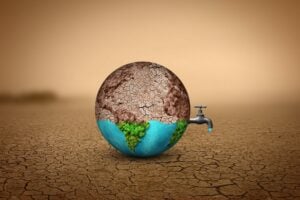The UK government looks set to approve controversial geo-engineering experiments aimed at blocking the sun to help combat global warming.
Backed by £50 million in funding from ARIA (the Advanced Research and Invention Agency), the project will test radical new methods designed to reflect sunlight away from the Earth’s surface.
If successful, scientists say these techniques could temporarily cool the planet, buying time to cut global carbon emissions, but critics warn the unintended consequences could be catastrophic.
Blocking the Sun Logistically
The trials will aim to prevent excessive sunlight from reaching the Earth’s surface by either launching clouds of reflective particles into the atmosphere or using seawater sprays to make clouds brighter.
Professor Mark Symes, Programme Director for ARIA, said there would be ‘small controlled outdoor experiments on particular approaches’
He said: ‘We have strong requirements around the length of time experiments can run for and their reversibility and we won’t be funding the release of any toxic substances to the environment.
‘Decarbonisation is vital, but our current progress puts us at risk of triggering a large number of temperature-induced climate tipping points. This programme will explore critical unanswered questions as to how – or whether – we might cool the Earth safely and responsibly on the timescales required to avoid climate catastrophe.’
One area of research involves Sunlight Reflection Methods. This includes Stratospheric Aerosol Injection, whereby tiny particles are released into the stratosphere from high flying aircraft to reflect sunlight.

Another potential solution is Marine Cloud Brightening in which ships would spray sea-salt particles into the sky to enhance the reflectivity of low-lying clouds. It follows observations that the clouds above shipping routes were far brighter than usual, as pollution from the sulphur-burning vessels caused them to be more reflective of sunlight, creating an overall dimming and cooling effect.
Symes said the project would not use toxic substances and that an environmental impact assessment would be published before any outdoor experiments and that people in the area would be consulted.
‘We will be announcing who we have given funding to in a few weeks and when we do so, we will be making clear when any outdoor experiments might be taking place,’ he added.
‘One of the missing pieces in this debate was physical data from the real world. Models can only tell us so much.’
However the EU’s Scientific Advice Mechanism, which provides independent scientific evidence and policy recommendations, warned that geo-engineering such as blocking the sun, could have a range of effects – both intended and unintended – that would be difficult to predict.

Its research said that blocking the sun could lead to uneven impacts on the climate in different parts of the world, and some of the larger-scale interventions would need to run for decades before their impacts are felt.
The review warned of negative consequences from blocking the sun including damaging ecosystems, changes to rainfall patterns and possible issues with food production.
Geo-engineering would also fail to address other impacts of excess carbon in the atmosphere, such as ocean acidification or changes in vegetation patterns, said the team.
And in a joint statement Professor Michael Mann of the University of Pennsylvania and Professor Raymond Pierrehumbert of University of Oxford said: ‘The Aria geo-engineering programme is a dangerous distraction from the work that needs to be done to achieve net-zero carbon dioxide emissions.’
Professor Hugh Hunt, Deputy Director of Cambridge’s Centre for Climate Repair, was more positive.
He said: ‘While geo-engineering is not without its risks, the risks of inaction are far greater. The urgency of the situation demands bold and innovative solutions, and geo-engineering offers a pathway to avert the worst consequences of a rapidly warming world.’










